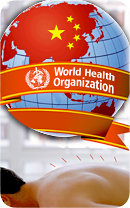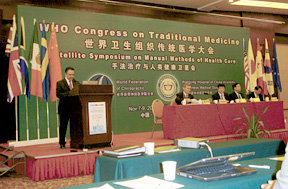In her opening address to congress attendees, Dr. Margaret Chan, WHO director-general, emphasized that the growth of CAM in affluent societies reflects not only its strengths, but also the weaknesses of modern medical care. "Medical care has become depersonalized, some would even say 'hardhearted.' ... The trend towards highly specialized care works against a sympathetic doctor-patient relationship. In too many cases, the patient is no longer treated as a person, but rather as an assembly line of body parts each to be managed, often with great expertise, by an appropriate specialist. ... In the views of at least some commentators, the rise of alternative medicine is a quest for more compassionate, personalized, and comprehensive health care."
 Dr. Chan concluded: "The two systems of traditional and Western medicine need not clash. Within the context of primary health care, they can blend together in a beneficial harmony, using the best features of each system, and compensating for certain weaknesses in each. This is not something that will happen all by itself. Deliberate policy decisions have to be made." The Beijing Declaration Supporting CAM Growth
Dr. Chan concluded: "The two systems of traditional and Western medicine need not clash. Within the context of primary health care, they can blend together in a beneficial harmony, using the best features of each system, and compensating for certain weaknesses in each. This is not something that will happen all by itself. Deliberate policy decisions have to be made." The Beijing Declaration Supporting CAM Growth
On Nov. 8, 2008, congress participants adopted the Beijing Declaration, underscoring "the need for action and cooperation by the international community, governments, and health professionals and workers, to ensure proper use of traditional medicine as an important component contributing to the health of all people, in accordance with national capacity, priorities and relevant legislation." The declaration outlines action steps to facilitate this in 2009 and beyond:
- "The knowledge of traditional medicine, treatments and practices should be respected, preserved, promoted and communicated widely and appropriately based on the circumstances in each country.
- "Governments have a responsibility for the health of their people and should formulate national policies, regulations and standards, as part of comprehensive national health systems to ensure appropriate, safe and effective use of traditional medicine.
- "Recognizing the progress of many governments to date in integrating traditional medicine into their national health systems, we call on those who have not yet done so to take action.
- "Traditional medicine should be further developed based on research and innovation in line with the "Global strategy and plan of action on public health, innovation and intellectual property" adopted at the 61st World Health Assembly in resolution WHA61.21 in 2008. Governments, international organizations and other stakeholders should collaborate in implementing the global strategy and plan of action.
- "Governments should establish systems for the qualification, accreditation or licensing of traditional medicine practitioners. Traditional medicine practitioners should upgrade their knowledge and skills based on national requirements.
- "The communication between conventional and traditional medicine providers should be strengthened and appropriate training programs be established for health professionals, medical students and relevant researchers."
 The Changing Face of Information Delivery
The Changing Face of Information Delivery
With the Internet turning 40 this year, technologies are influencing health care on an increasingly broad scale: electronic health records, educational Webcasts/Webinars, Web-based interactions between providers, and between providers and their patients. This trend will continue and is, in fact, vital to professional growth, said Donald M. Petersen, Jr., publisher of Acupuncture Today, who spoke at the congress during a special program on intra-institutional delivery of education and information.
"Education and information are the most obvious initial arenas for the Web to play an integral role in our profession," he said. "This is being fueled by the cost of travel and the need to be able to access information at any time from anywhere. It will probably take some time before all information is delivered digitally, but clinicians will want to participate in this evolution now while they can easily learn and grow with the developing technologies."
Acupuncture Today editorial staff members research, investigate and write articles for the publication on an ongoing basis. To contact the Editorial Department or submit an article of your own for consideration, email mailto:
.



